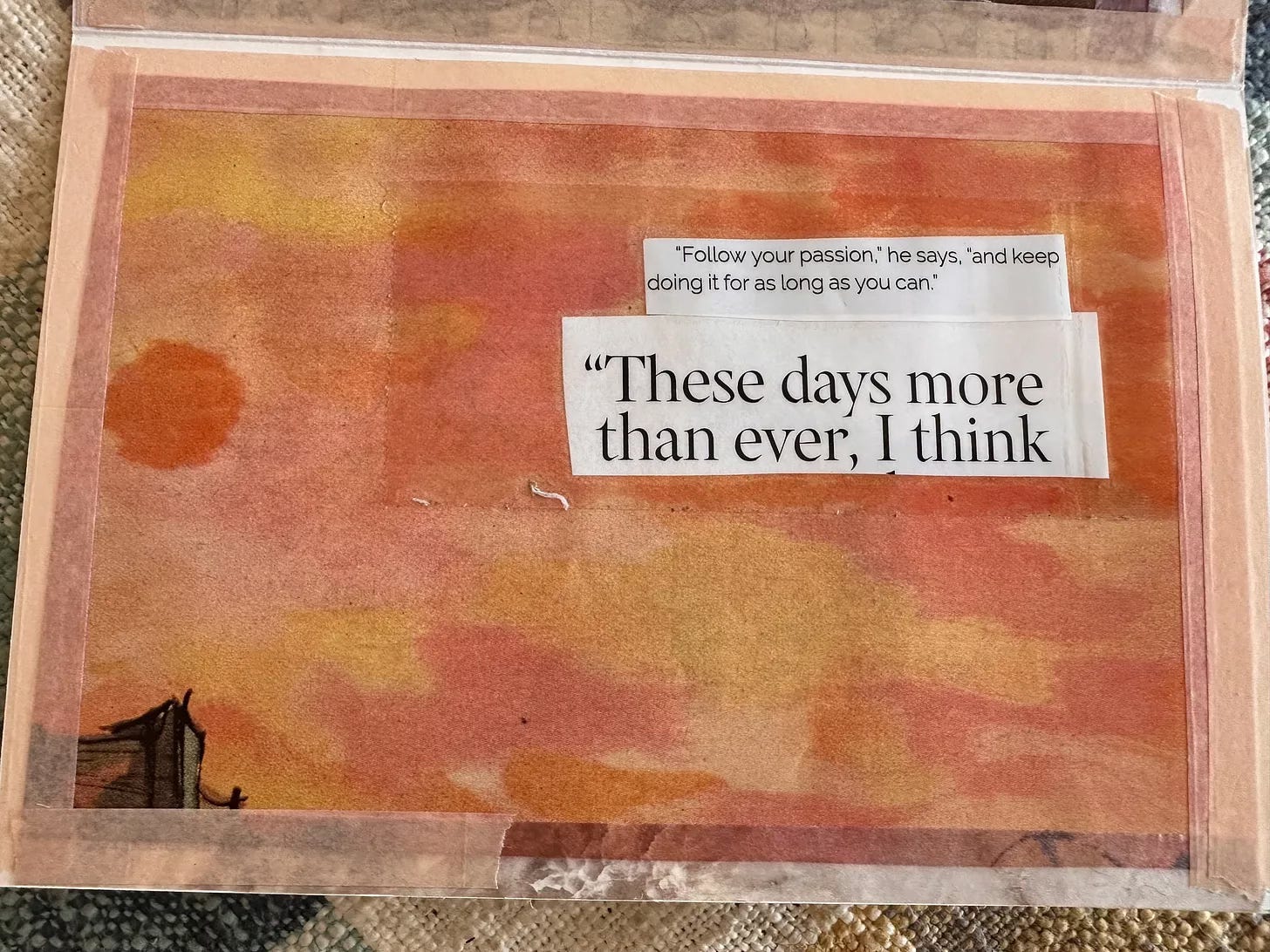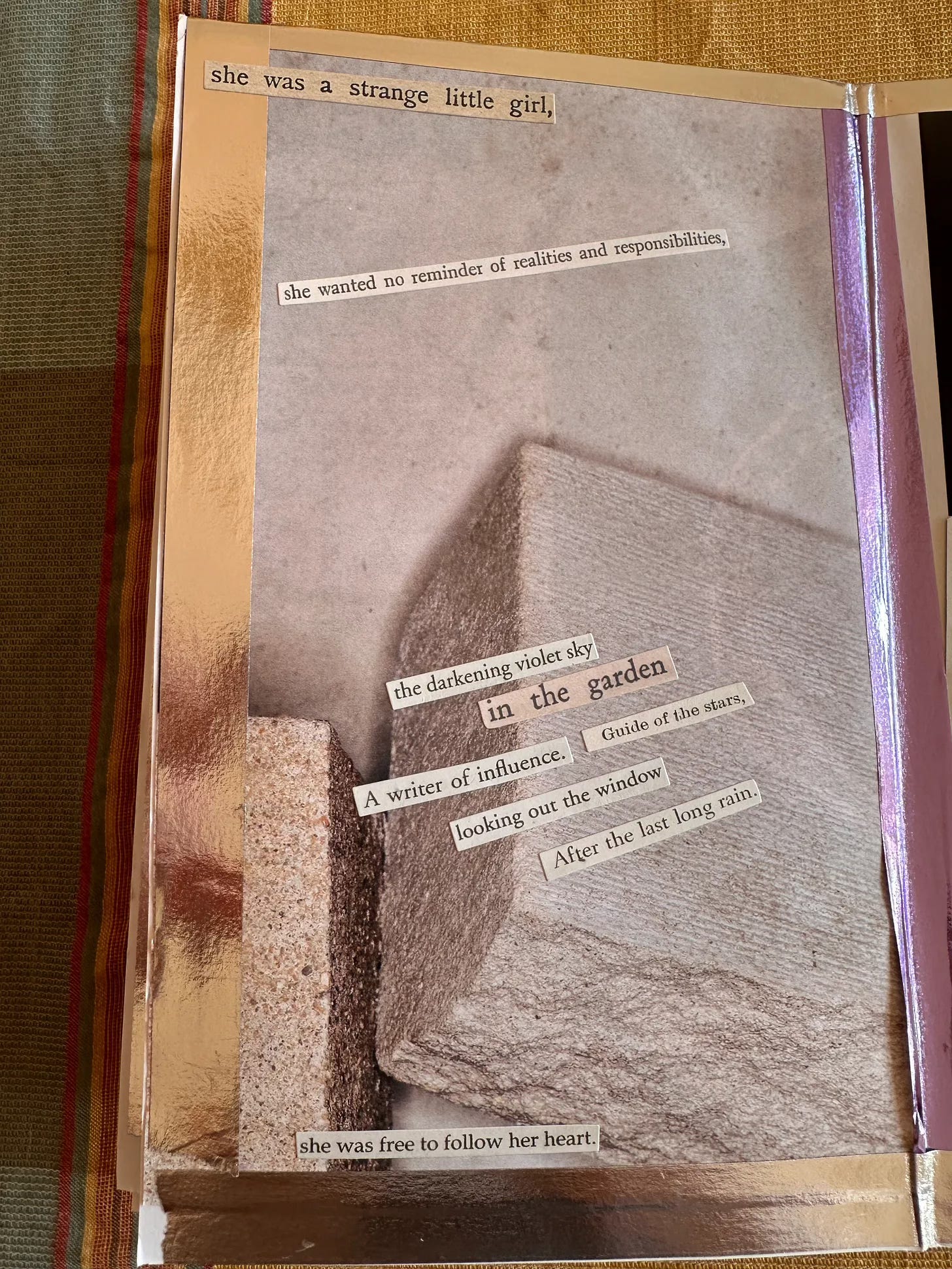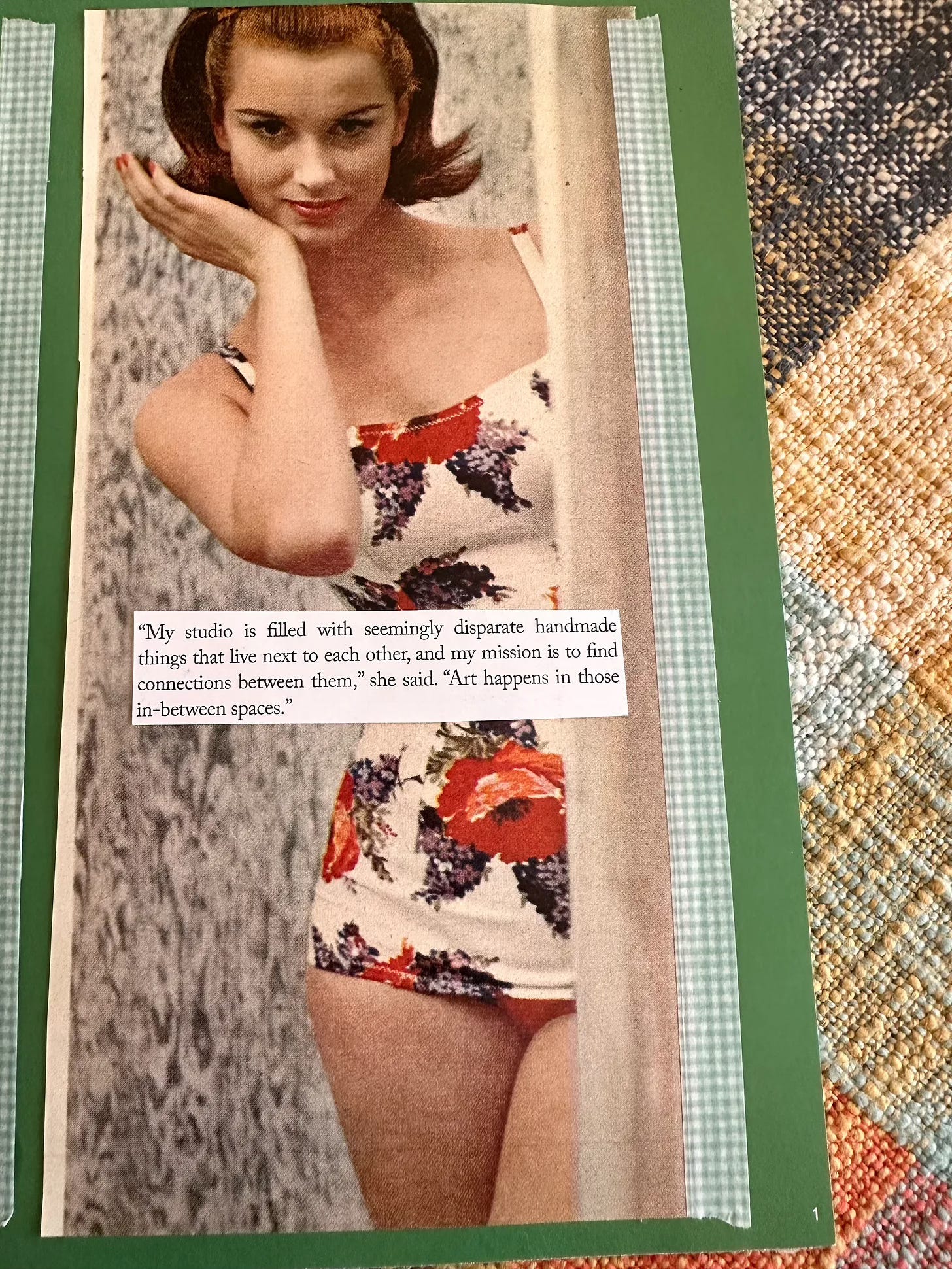Do You Need To Write Every Day? How about every day except Sunday but sometimes on Sunday?
Or: there's actually no right formula to "be a writer," even specifically a successful one, or any other type of creative for that matter, and here's a lens into that from what works today for me.

If you want to take yourself seriously as a writer and have the world take you seriously as such, how often do you have to write? Is it imperative that you write every single day? In contrast, should you be so devoted to the muse that you create only when inspiration strikes? There are countless books, magazines, workshops with opinions on this, with hacks and tricks and studies and advice. And they can be helpful to an extent … but mostly the answer, I think, is that you have to figure out what actually is the most right for you and be open, too, to the idea that what works for you might change with time.
What would you say if I said that I write every day except on Sundays … unless I miss a day and then I write on Sunday …
I am currently in the process of working on a book that is a passion project of mine. It’s the deeply personal work that I’ve always assumed that I would devote time to at some point but was never ready to do so until now. In some ways, the right timing has made it easy to commit myself to this book. I wrote almost every single day of December, even when I had relatives staying with me for ten days in a small house, and I have more than one hundred single spaced Google Doc pages to show for it.
This is my experience of how art and health intersect. If you are interested in assistance in understanding this in your own life: Order a Creative Health Assessment or Book a 1:1 Coaching Call.
I also have a long way to go because this is one of those pieces that’s going to require a whole lot of spewing of messy ideas across pages before it even begins to take the shape of something I might actually want to share with the world. More than half of those hundred pages will probably end up excised from the book as just what I needed to write to be able to get myself to the thing I actually wanted to write.
Having written half a dozen or so books that were more work than passion, books I try to be proud of in some way but mostly am not, I am thrilled and proud and excited to be working on this book now. I love it. I love what’s emerging, I love the process, I love the commitment to myself that has made doing this possible. And yet.

And yet, this morning I had to drag myself to the page. I almost talked myself out of it. I didn’t have anything I wanted to say, I didn’t want to work on it, I have too many other things to do, blah blah blah. Luckily, I have been doing this writing thing for enough years - and working on understanding myself as both a creative and a human - that I am able to see what is happening and know what I need to do.
In this case, for this project, I have committed to myself that I’m going to work on this piece every morning before I let myself do anything else on the computer. I only commit to writing a single page but it always goes longer than that once I start. Because I know myself well enough to know that if I “allow” even one momentary diversion into my email or reading blog essays or looking up some random thing I “need to know in order to be able to write,” then I am done for the day. I might write other things, do various work that looks like writing, but I won’t do the one page of writing on this particular project.
And I know myself well enough to know that if I allow that on one random day then I’ll allow it the next and the next.
I know myself well enough to know that if I don’t write today then I’m going to tell myself negative things about what that says about me as a writer and then it’s going to be a million times harder to feel confident enough to write tomorrow.
I also know that I need an out, a loophole, to this rule of daily writing. For this project, the loophole is that I don’t have to write on Sundays. I can, but I don’t have to. Today is not a Sunday, so I do all of the things that I have to do in order to drag myself to the page, and one of those is to tell myself, “it’s okay, it’s almost Sunday, you don’t have to write on Sunday.”
In very rare instances, when I really can’t force myself to the page on a given day, I tell myself, “okay, you can take the break, but it means that you have to write on Sunday.” And I do. It gives me an out to look forward to as well as an alternative if things aren’t working. I almost always write Monday - Saturday but if I miss a day, I make it up on Sunday.
This is a completely arbitrary rule. I don’t work on a Monday-Sunday schedule so Sunday is neither the start nor end of the week. I don’t go to church or otherwise do anything particular on Sundays that I don’t do on other days of the week. There’s no reason that Sunday should be my day off. There’s no reason, for that matter, that I should give myself one day off instead of two. But I picked one, and I picked Sunday.
But most importantly, I know that:
I really want to write this piece.
The ritual of daily writing is the right way for me right now.
But I also need the out.
And I am healthy enough to be able to engage with this daily writing.
I can’t overstate how important these three components are for me.

First, I really want to write this book.
As someone who has made a living off of writing for about twenty years, I have often written things because I financially needed to do so. Occasionally these were things I didn’t want to write. Occasionally these were things that I really wanted to write. Mostly, they were in between … there was something compelling enough about them that I wanted to write them, either because the opportunity was offered or because I was pretty sure this thing I wanted to share could be monetized … but it wasn’t clear cut how much was really wanting to and how much was wanting to because it paid to do so.
It was murky. And I have made my peace with that. But in that process, it became extremely difficult to actually be able to understand deep inside my bones whether or not I truly wanted to write any given thing. I’ve lost touch with my body and intuition in a million small ways over the years, from surviving trauma, from living inside of complicated systems. It’s taken a long time to mostly know what I want most of the time, and this applies to my writing too. I really want to. I know it.
And so, even when my mind and body and energy and all the things resist and say, “I don’t want to write this today,” I know that actually I do want to write it. I want to write the thing even when I don’t want to do the writing. Almost every day, I don’t want to write it, and then I make myself write it, and then I am glad that I wrote it. I’m not just glad in the sense of feeling like I accomplished something. I am glad from head to toe, heart to soul, in the way that doing the thing creatively that you know you’re meant to do makes you glad. In a way that you can only understand if you’ve written a song or painted a painting or done anything for the pure joy of creating it.
Second, the ritual of daily writing is the right way for me right now.
There are so many ways to write a book. You can commit to writing a certain number of words per day or week or month. You can commit showing up to a writing group or class once a week with a new piece of writing in hand. You can commit to an MFA that requires a certain amount of writing completed at the end of it, however you might make that happen. You can go on a writing retreat and write pages and pages and pages in just a few weeks then write nothing much before and after. You can write only when the muse insists, trusting that this is your process. None of these are right or wrong.
Almost every writer/creative that I know has, at one time or another, tried Julia Cameron’s Morning Pages. I don’t know too many who have completed The Artist’s Way or stuck with morning pages for years, although I do know some. What I’ve discovered through conversations with these creatives is that most of us find some kind of benefit to the general concept of a regular daily creative routine but that this specific formula isn’t quite “right.” Taken to the letter, you’re “supposed to” write three pages of longhand stream of consciousness writing first thing in the morning, before even coffee although in later years Cameron acknowledged exceptions for coffee drinkers, and to do this daily without exception.
Personally, I find that it’s beneficial for me to do this kind of unblocking (creative unblocking but also just life-mess unblocking) for a period of time now and then but not every day all year long. It’s every day for a season or a reason and then it passes. I also find that it works better for me if it’s not what I do first thing but actually an hour or two into the day, after I’ve played some games on my phone and read a book. This seems counterintuitive and “wrong” by the “rules” of Morning Pages, but it’s what works for me. And although I do find that if I push through to the three page minimum, I often uncover something important, I also find that giving myself a one page minimum works better for a variety of reasons. I first tried Morning Pages when I was in my early twenties. I am in my mid-forties now. I can’t tell you how many times I re-tried doing them “right” before I realized that they’re a great tool but also there’s no one right tool for everyone.
For me, what’s working is daily writing before I do anything else on the computer.

But I also need the out.
I need the Sunday rule. The loophole. The structure with an option for when the structure is too restrictive.
All of the different writing approaches (workshops, books, guides, hacks) can be useful to learn about and apply to see if they work for you. For me, they’re a lot like psychological frameworks or personality tests (Enneagram, Myers-Briggs, astrological signs). While some people believe deeply in the complete truth of them, for me, they are guides. They provide me with useful insight which I can then pull from to develop habits and make choices that align with the traits that resonate for me.
Happiness expert Gretchen Rubin has a few frameworks that help me with self-understanding. One of them is the “moderator vs abstainer” approach. Let’s say that you’re trying to quit drinking coffee. Would you be more likely to succeed if you quit cold turkey and abstain completely? Or if you allowed yourself a little bit here and there? There’s no right answer, but most people tend towards one or the other. I’m mostly a moderator. I need the occasional treat to make the habit actually stick. Abstinence is too hard for me. But I also need structure. If I say, “it’s okay to have a cup of coffee now and then,” then it will be once a week then once a day then … you get the picture. So I say, “I don’t drink coffee except on mornings when I have a meeting”. Or whatever. I doubt I’ll ever be drawn to quitting coffee but applied to the habit of writing, I currently write every day no matter what except Sundays and if I miss a day then I do write on Sunday. That is a pretty absurd writing rule. If I tried to teach a workshop recommending it or write a book explaining why it’s the only way that works, it might appeal to a lot ofpeople momentarily because we all want quick fixes to dealing with ourselves, but ultimately very few people would likely find that this specific schedule is what works for them.
Read through the pages of either of the Daily Rituals book by
to discover that there’s no secret ritual or routine that works for everyone. But also that there’s something that works for each of us. We just have to find it.And it can change with time. Which brings me to the final key point:
And I am healthy enough to be able to engage with this daily writing.
I live with double depression which means, in part, that there are recurring bouts of pretty serious depression now and then. Depression means that there have been times when I was not healthy enough to do daily writing like this.
Because I was too fatigued to do almost anything so I’d go back to bed before I could write.
Because I needed to make a living through the fatigue and so I had to pick and choose how to “use my spoons” when I was out of bed.
Because depression tells me that it’s all pointless anyway so why would I bother and it’s really hard to fight through that. It’s not the same as fighting the, “I don’t want to write today,” resistance. It’s fighting for a reason to believe in existence at all. That’s a hard fight to fight daily.
Because depression gives me brain fog which means that even if I convince myself that there’s a reason to write and force myself through the fatigue to the page, the thoughts might just not come. I might put down words and they don’t make sense and I feel proud of having “accomplished” something that looks productive but it doesn’t feel good and the words aren’t what I wanted to say and I don’t use them anywhere anyway.
Because, for me, writing about the things I believe the most in, am most passionate about, means being deeply honest with myself about all kinds of things in my life and in the world around me and frankly, some of those things exacerbate depression.
Because, in order to write about something you are passionate about, you must be able to feel passion. I don’t feel passion in depression. I don’t feel much at all.
I have not always been healthy enough to do the kind of daily writing that I am doing right now. And when I was not healthy enough, pushing myself to do it wasn’t usually beneficial. More often that not, what would happen is that for any combination of the above reasons, I would give in and not write that day. And then I would hate myself, berate myself, weigh myself down with expectations. I would demand of myself to write twice as much the next day or not do anything else until I had written which meant not doing anything else at all because the writing never happened.
Telling myself that I needed to write every day did not make me write every day because it wasn’t possible through my depression to write every day. And telling myself to write every day and then not being able to do it exacerbated many symptoms of my depression.
So, the advice to write every day, wherever it might have come from, can be true, and it’s true for me right now, but it can also be patently untrue, as it has been for me before.
Having lived through so many challenging health experiences in my life, I am grateful, to a degree I’m not sure I can articulate, to simply be healthy enough in this moment that I can know what I want to write, realize it’s helpful to work on it every day, and be able to do so without compromising that health.
From the outside, it probably doesn’t look any different than any of my other writing projects that I started and ultimately finished. But from the inside, where it matters, it’s an entirely different experience.
I will not always be in a period of life where I’m happily engaged in daily writing on a project that I wholeheartedly want to work on. And I feel lucky to know this and to know what I need to do right now to enjoy the experience as much as possible while I’m in this moment.
If you read this far, perhaps you liked the work. The work does take work. It only continues with support, so please consider subscribing. My annual rate starts at $10 per year.





I write my novels in bursts, BUT I write in my journal every night. Even if it’s just two sentences. I started that habit last year and am determined to keep on with it. I lost so many good memories in my teens because I was too lazy to keep a journal. So I guess in a sense I do write SOMETHING every day.
Having also suffered from major depression, I totally relate to what we should expect of ourselves while going through it. Giving myself permission to not think I have to "produce" while I'm suffering terribly was so freeing. Self-care! I love the idea of giving ourselves an "out" rather than experience all the time wasting false guilt.